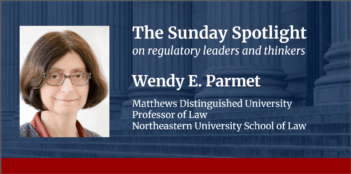
This publication’s COVID-19 series offers vital lessons about law and effective governance in response to public health threats.
About four months ago, the world went still—at least as still as ever in modern history. With the global spread of a novel coronavirus, people around the world started sheltering in place—sometimes of their own accord, but more often by the command of their governments.
Confronted with a viral breakout of unprecedented proportions in modern history, the editors of The Regulatory Review announced a special series of essays tracking and analyzing regulatory responses to the pandemic from around the world.
For the last three months, The Review has every week published new essays by leading scholars and practitioners on the measures that 25 different governments have put in place in response to the COVID-19 crisis. All told, The Review has published 40 essays in this series, covering legal responses on every continent (save Antarctica) as well as developments at international bodies such as the World Health Organization and the European Union. This series is more extensive than any other in The Review’s ten-year history. It brings together, like no other publication has, an impressive array of scholarly perspectives on legal responses to COVID-19 from around the world.
The Review’s formal completion of this unparalleled series hardly means that the issues it raises have been left behind. On the contrary, the global pandemic still rages, cases of COVID-19 continue to surge—including in the United States,—and the pandemic’s devastating public health and economic effects still plague our societies. As a result, the kinds of governmental responses and legal issues that this series has chronicled remain both relevant and deserving of greater understanding.
National, state, and local governments continue to grapple with regulatory changes, especially as many countries try to reopen their economies in what seems at present to be a quixotic quest for some semblance of normality. Given the virus’s persistence, I can say with certainty that, even though this series has formally come to an end, The Regulatory Review’s coverage of COVID-19-related regulatory issues will undoubtedly continue for some time to come.
What lessons can readers glean from this remarkable collection of essays? Although no summary can do justice to the richness of such a deep and diverse collection of writings, as a reader, I find myself coming away from the series with four key lessons.
Global pandemics receive national responses. Former Speaker of the U.S. House of Representatives Tip O’Neill once said that “all politics is local.” Much the same is true for battles to fight contagious diseases—even when they take the form of a global pandemic. The primary responses to the COVID-19 crisis have, by necessity, been based within individual countries.
Within each country, national government leaders have needed to coordinate with their local and regional officials. After all, communicable disease spreads between individual people situated in individual places. National responses need to support local measures to test, trace, and isolate exposed individuals. Governments also need to make sure that, when those who are exposed get sick, these individuals have ready access to adequate health care resources.
By emphasizing the significance of national responses to COVID-19, I do not deny the importance of international efforts to share information, support research, and ensure the functioning of global supply chain networks in medical supplies and—ultimately—a vaccine. Rather, I focus on the individual and local nature of infection spread to highlight the vital coordinating and leadership role that national governments must play during a crisis of this nature. The extensive disease spread in the United States, along with unconscionably high levels of fatalities, tragically shows what happens when national leaders duck their responsibility.
In the end, as interconnected as the world has become, a global pandemic reveals how much governance remains at the level of the nation-state. Responses to a global public health emergency depend on a government’s capacity to respond. Notwithstanding decades of pronounced globalization, the bulk of governing capacity around the world still resides within countries, not across them.
Law responds dynamically. A second lesson is that national legal systems must change, sometimes significantly, to fight a deadly communicable disease. As The Regulatory Review’s series has extensively documented, most countries have passed new laws and regulations or made regulatory modifications to address the pandemic. In some cases, governments have significantly reconfigured legal authority. New balances have been forged between state and society, regulation and liberty, and government and business.
Law’s dynamism in a time of disease marks a major theme running through nearly every country in The Regulatory Review’s series. Nations require nimble legal responsiveness not merely because of the novelty of the virus itself, but also because people’s behaviors, attitudes, and interests are varied and changing. A pandemic is a social problem as much as a medical one. This means, as I explain in my essay opening the series, that “regulating well necessitates ‘obligation management:’ the adjusting and adapting of both rules and unrules in the face of changing risks, technologies, economic conditions, and knowledge of the world’s conditions.”
Essay after essay reveals the dynamism that undergirds obligation management. Most countries—China, Germany, Italy, Israel, and South Africa, to name just a few—locked down large portions of their population in an effort to flatten the curve of the outbreak. But then they later confronted decisions about when and how to reopen their economies. In some countries, after lockdowns have been lifted, the virus has reemerged, forcing officials once again to confront hard decisions about whether to close down economic and social activity.
We can hope that officials are learning. From the relative successes described in The Review’s essays, it appears that Singapore, South Korea, Taiwan, and Vietnam have learned much from previous experience with SARS and other outbreaks, and they have implemented effective responses to COVID-19 based on lessons learned from the past. Unfortunately, not every country’s leaders learned these lessons or internalized them.
Emergency power risks illegitimacy. A third lesson follows directly from some of the changes countries have made to how their legal authority is allocated, especially changes that give executive officials greater regulatory power. These kinds of changes risk allowing governmental authorities to use the public health crisis as a pretext for accumulating power that they could ultimately abuse. Already, some “illiberal governments worldwide are using the pandemic as cover for restricting media freedom and cracking down on political opposition and civil society,” write Alexander Cooley and Daniel Nexon in a recent issue of Foreign Affairs.
Not only have many countries responded to the pandemic by giving their executives more power, they have sometimes exempted those leaders from normal forms of democratic and judicial oversight. As temporary measures, these changes might be helpful or even essential steps for addressing major public health risks. But once the crisis is over, will executives actually give up their power gains, return authority to legislatures, and resubmit to normal forms of judicial oversight?
The essays in The Regulatory Review’s series about countries as diverse as France, Israel, India, Chile, and Switzerland raise precisely this question. The very changes to constitutions and democratic procedures that leaders have deemed necessary in the short-term to address a fast-moving virus may end up remaining in place. In the medium to long-term, they may be used to deny protections for minorities or bypass more accountable forms of governing with respect to other policy issues. To borrow from the title of Thomas Perroud and Emma Guernaoui’s insightful essay in The Review’s series, the COVID-19 public health crisis should be considered a potential democracy crisis too.
Leadership makes the difference. The final lesson is that responding adequately to the COVID-19 crisis demands more than just law. As important as the law is when societies confront a public health crisis, legal systems do not work on their own. Leadership matters, and in times of crisis, leadership almost surely matters more than anything else. Legal systems and administrative bureaucracies designed to function during normal times need to be affirmatively directed, perhaps even at times jolted out of existing routines, so they take the responsive and vigilant actions that the times demand. Moreover, strong and consistent leadership is vital for securing necessary coordination between various regional and local governing authorities as well as cooperation between the public and private sectors.
Leadership failures have plagued many countries and institutions in the face of the coronavirus outbreak. Chinese leaders initially acted defensively and failed to provide adequate transparency when the first signs of viral spread emerged. Leaders at the World Health Organization failed to overcome institutional tentativeness to issue warnings earlier. And instances of abject national leadership failure can be found in both Brazil and the United States, where these countries’ Presidents continue to deny the seriousness of the public health threat. Rather than helping lead their nations to bring outbreaks under control, President Jair Bolsonaro and President Donald J. Trump have actually impeded effective risk communication and management.
The United States has suffered the needless loss of an estimated tens of thousands of lives due to the country’s sluggish response to the virus in early 2020. As word of the virus first emerged, the U.S. Centers for Disease Control and Prevention and U.S. Food and Drug Administration initially approached the development of testing by following their normal tendencies to err on the side of caution—tendencies that are appropriate in normal times but which proved hugely detrimental in the face of a fast-spreading pathogen. Under these unique circumstances, the United States needed competent presidential leadership to break the well-intentioned bureaucratic officials out of their normal routines so they could act quickly.
President Trump not only failed to provide such leadership, but in early March he even openly opposed actions that would have identified infected individuals—a position he maintains to this day, apparently because he thinks that testing, rather than being a vital tool to trace and contain the virus, only makes him look bad. Rather than helping to coordinate responses across the states, President Trump has “largely punted to the states the challenge of solving this complex crisis,” as Allison Hoffman and Simone Hussussian write in their essay in The Review’s series.
Although this series has focused extensively on legal issues, it cannot be forgotten how much the effectiveness of the law—especially administrative law—depends on responsible leadership. The difference leadership makes is evident in Richard Parker’s account of the efforts of Prime Minister Jacinda Ardern to bring the virus under control in New Zealand. Moreover, as Maria De Benedetto points out in her essay on Italy, public leadership must earn the public’s trust in a time of crisis if people are to follow instructions and comply with the law. Only with honest, scientifically informed, and active leadership can nations even hope to stay afloat through the treacherous waters ahead.
* * *
In closing out this series, even though not ending The Regulatory Review’s coverage of the regulatory implications of COVID-19, I would like to share some final personal words of appreciation to everyone who made this achievement possible. I thank first all the contributors who authored essays in this series, for without their willingness to share their time and expertise, this rich, cross-national collection would not exist. These authors are owed particular thanks because they worked on tight timetables and often under difficult circumstances in their own lives.
The series overall was the brainchild of Neysun Mahboubi, a remarkable colleague at the University of Pennsylvania Law School and the Center for the Study of Contemporary China at Penn. Neysun adds tremendous insight to any group, endeavor, or conversation in which he is a part. This project was no exception. His spark was exactly what The Review needed. I can now add his brilliant vision for this project to the many other reasons why I greatly admire his intellect and value his collegiality.
When it comes to the editorial staff of The Regulatory Review who carried off this undertaking, I simply cannot say enough about their talent and commitment. The editorial team quickly embraced Neysun’s idea for this project, and then they even expanded on it. Everyone on the staff gave their time to see the project come to fruition on a tight timeframe, while still meeting The Review’s standards of editorial excellence. This was no small feat—and not merely because this series was the most extensive ever published by The Review. Among other challenges, editing this series demanded painstaking fact-checking and review of laws outside the United States, often written in languages other than English.
The challenges created by the timing of this series also cannot be understated. It goes without saying that the series came together during a global pandemic, when members of the staff confronted challenges in their personal lives, from having to move back home when the university closed to managing anxieties about their own health or that of their family members. When the series began, Penn Law had just shifted classes to an online format. The editors, all students at the law school, tackled this series even while adjusting to their new academic environment.
On top of this—and something which outsiders would never know—the editorial board members who carried out this undertaking were brand new to their jobs. Yet they embraced and implemented the project enthusiastically, even though they had just barely finished the training for their new editorial positions. Taking on a major initiative like this, while adapting to their new responsibilities of running a major daily publication all on their own, showed tremendous dedication and resilience. At the same time, these same editors also faced the need to recruit and train a new crop of associate editors—a process that had to be conducted totally online this year but has proven as successful as ever.
In short, the editors put together this extraordinary series under the most demanding of conditions—and yet they pulled it off magnificently well.
Every member of the editorial board and every associate editor has my appreciation for this accomplishment. From my perch as The Review’s faculty advisor, I have seen this series produced as a true team effort. That said, as with any team, some members contributed more than others. I would be remiss not to mention specifically the core four individuals who shouldered the most in producing this remarkable feat.
Meghan Downey and Lucas Siegmund, as The Review’s executive editors, bore the primary responsibility for working with authors, fact-checking and editing essays, and putting the finished projects into publication. They each devoted a tremendous amount of their time and talent in bringing this series to fruition. Lynn McDonough, as managing editor, has done an impressive job of keeping the internal and digital operation running smoothly throughout the past several months. And Larissa Morgan, editor-in-chief, not only gave this series the benefit of her overall leadership—on top of the many other responsibilities she has so ably carried out in leading The Review—but her close reading and careful editorial judgment of each essay in this series has left an extremely positive imprint.
Producing this series has been a true public service on the part of the editors of The Regulatory Review. It is The Review’s hope that lawyers, leaders, and citizens everywhere, by learning how different nations have responded to the COVID-19 crisis, will gain a better understanding of law’s potential as an instrument for protecting public health, promoting economic welfare, and securing justice for all.
This essay is part of an ongoing series, entitled Comparing Nations’ Responses to COVID-19.




